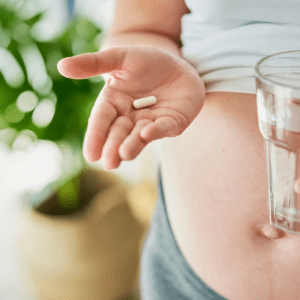
30 Nov What to Look for in Antenatal Supplements
During pregnancy, while maintaining a healthy, balanced diet is important, supplementation may be necessary due to:
- an increased demand;
- difficulty to obtain key nutrients in sufficient amounts from the diet;
- or losses of nutrients obtained from the diet due to morning sickness.
Prenatal or antenatal supplements can become overwhelming, and difficult to pinpoint which nutrients are actually important for each individual need
.
What nutrients should we focus on?
Nutrients that we want to focus on include iron, folate and iodine. In addition to that, Vitamins B12, D, K, calcium, and omega-3 fatty acids also demonstrate beneficial outcomes for the growth and development of your baby! However, we cannot supplement with all these nutrients in one tablet. Some need to be taken separately, for example, iron, which is not well absorbed with calcium, if this were to be taken together.
Let’s take a closer look below
Folate is recommended to be taken for a minimum of one month before conception, but ideally three months prior, and for the first 12 weeks of pregnancy. It is beneficial to look out for the activated form of folate (L-methylfolate) on your prenatal supplement, as this is better absorbed. The recommended dose is at least 0.4mg daily, to aid the prevention of neural tube defects (NTD), however for those with an increased risk of NTD (such as pre-pregnancy diabetes mellitus, previous child, or family history of NTD or BMI greater than 30), it is recommended to take 5mg daily.
Vitamin B12 is an extremely important vitamin, especially for vegetarians and vegans who lack the diet that contains this nutrient. B12 deficiency during pregnancy and lactation can cause long term neurological defects in exclusively breast-fed infants, even after correcting the deficiency, so it is important to act early and monitor this if prone to deficiency. Supplementation amounts will vary with the diet but is based off the Recommended Dietary Intake (RDI) of 2.6 mcg/d in pregnancy and 2.8 mcg/day if lactating. Look out for the activated form of B12 in your supplement (methylcobalamin and/or adenosylcobalamin), as this is better absorbed in the body.
Iodine supplementation of 150mcg/day should be practiced by all women who are pregnant, breastfeeding or considering pregnancy to reduce the risk of cretinism. Iodine deficiency is increasing in frequency, which is suspected due to the decreased consumption of iodised salt intake and the reduction of iodine in milk. Therefore, supplementation is significantly important as iodine ensures adequate production of thyroid hormones are produced to support the healthy brain development of the foetus & breastmilk supply for the breastfeeding newborn. The thyroid is a powerhouse during pregnancy and breastfeeding – check out how you can support it during this period.
Vitamin D stores are being used during huge growth periods in pregnancy and postpartum, for laying down bone structures for the infant. It is also needed to work with other nutrients such as Vitamin A, Vitamin K2, calcium, zinc and boron. As a result, being Vitamin D deficient during pregnancy and breastfeeding, will dramatically affect not only yours, but also your child’s health in the long term.
Supplementation is encouraged for women who already are deficient or those who have an increased risk of deficiency such as those with reduced sunlight skin exposure, those who use sunscreen on a regular basis, dark-skinned women, or women with a BMI greater than 30. Supplementation is also recommended for infants in the first 12 months if they are also at risk. In these circumstances, it is important to seek individual advice from a Dietitian to see if this is necessary. Depending on the level of deficiency, the recommended dosage ranges from 25-50. To learn more, check out this blog on Vitamin D.
Iron demands in pregnancy and during lactation are especially significant due to the increased red cell volume, blood loss around the time of delivery and demands of the developing foetus and placenta. Deficiency can result in increased risk of postpartum haemorrhage, miscarriage, and cognitive development of the child. Iron supplementation is recommended for women at particular risk of deficiency such as vegetarians, women with multiple pregnancies or those with anaemia. An iron supplement containing at least 60mg of elemental iron is recommended daily, however all women should have their haemoglobin levels checked at 28 weeks, and 6 weeks postpartum, where their doctor or Dietitian will inform them if iron supplementation is necessary. Look out for the elemental iron value on the pack and ferrous form in your supplement as a better absorbed form of iron. Iron polymaltose (ie. Maltofer) is also another form that may have less side effects on those who can’t take a ferrous sulphate form.
Calcium supplementation has found to be of benefit in reducing the incidence of hypertensive disorders, such as pre-eclampsia and preterm labour. Those who avoid dairy in their usual diet and do not consume alternative fortified high calcium food, are recommended to supplement with 1000mg/day of calcium.
Omega 3 fatty acids are essential for the developing foetal brain and retina. Within the last 3 months of pregnancy, your baby will collect approximately 67 mg of DHA every day. This is continuously used for brain development until at least 2 years of age. At least 300mg of DHA should be consumed per day to provide enough for you and your baby. Main sources are through the diet from vegetable oils and seafood. Women whose dietary intake of Omega-3 fatty acids is low, such as those who eat very little seafood, should consider a dietary supplement. This may be obtained from fish oil or some commercially available pregnancy supplements.
Overall..
Supplementation of specific nutrients such as Folate and Iodine are essential for all pregnancies, whilst others such as Iron, Vitamin B12, Vitamin K, Vitamin D, Calcium and Omega 3 Fatty acids are dependent according to plasma levels. It is important to remember that more supplements aren’t always better, as there is a possibility for toxicity, or your body will simply stop absorbing the nutrient, and excrete it out through urine. Additionally, some prenatal vitamins are less comprehensive than they seem, and do not contain the adequate amounts to meet the RDA.
Therefore, it is important to work with a Dietitian during your pregnancy, to ensure adequate intake of these nutrients during such a high demand, as well as optimising the health for you and your baby during this exciting growth period of your life.
References
Nutrition & Pregnancy
Healthy eating during your pregnancy – Eat for Health
Pregnancy vitamins and supplements: A dietitian’s guide
https://mamacare.com.au/vitamins-supplements-dietitian/
Vitamins and supplements during pregnancy
https://www.pregnancybirthbaby.org.au/vitamins-and-supplements-during-pregnancy
Prenatal Vitamins – WebMD



Sorry, the comment form is closed at this time.